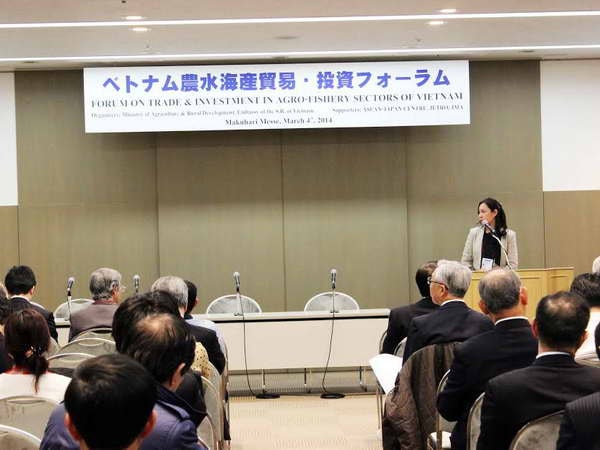Great potential for Vietnam-Japan agricultural and aquatic cooperation
The number of nearly 100 Japanese enterprises attending the Forum on Trade Promotion and Investment in Agriculture, Aquaculture and Seafood on the afternoon of March 4 at the Makuhari Messe Convention Center in Chiba Province, Japan, shows that Vietnam-Japan cooperation in this field holds great potential.
According to VNA correspondent in Japan, the 2014 Trade and Investment Promotion Forum was organized by the Ministry of Agriculture and Rural Development in coordination with the Vietnamese Embassy in Japan.
 |
| Ms. To Thi Tuong Lan, Deputy Secretary General of VASEP, discussed with guests attending the forum about opportunities and challenges in Vietnam-Japan seafood trade. (Photo: Huu Thang/Vietnam+) |
The forum attracted the participation of 13 typical Vietnamese enterprises and nearly 100 Japanese enterprises in the fields of agriculture, aquaculture and seafood.
This is an opportunity for Vietnamese enterprises to introduce, promote and attract Japanese enterprises to invest in this field which still has a lot of potential.
Speaking at the forum, Mr. Nguyen Trung Dung, Counselor in charge of trade at the Vietnamese Embassy in Japan, affirmed that in recent times, Vietnam-Japan cooperation in the fields of agriculture and fisheries has achieved many significant steps forward, making important contributions to economic development between the two countries.
Japanese enterprises have great potential to boost investment in Vietnam's agriculture and seafood sectors, in addition to traditional sectors such as industry and trade.
According to Mr. Nguyen Trung Dung, Vietnam-Japan cooperation in this field is a "win-win" relationship because, in addition to applying advanced technology to farming, production and processing of agricultural, aquatic and seafood products, businesses of the two countries not only meet the demand for clean, high-quality food for the market of more than 90 million people of the S-shaped strip of land, but can also export to the markets of third countries.
Ms. To Thi Tuong Lan, Deputy Secretary General of the Vietnam Association of Seafood Exporters and Producers (VASEP), shared about the opportunities and challenges in Vietnam-Japan seafood trade. According to her, Japan is the third largest seafood exporter to Vietnam, accounting for 7.8%, while Vietnam is the eighth largest seafood supplier to Japan, accounting for 9% of the market share in 2012.
From 1993 to 2011, Japan was always the largest single market for Vietnamese seafood, accounting for an average of 26% of seafood export turnover each year.
Not only the seafood industry, but also the fruit industry of Vietnam sees this as a rare opportunity to bring potential agricultural products to the Japanese market, one of the most demanding markets in the world.
Mr. Nguyen Thanh Binh, General Director of Vegetexco Vietnam, said that some Vietnamese fruits have created good brands in the Japanese market such as Hoa Loc mango, Chin Hoa durian, green-skin pomelo, Nam Roi pomelo, dragon fruit...
In 2013, Vietnam exported 1,000 tons of dragon fruit to Japan. Mr. Binh said that in order to exploit the potential and strengths of the Vietnamese fruit and vegetable industry to meet the needs of the Japanese market, Vietnamese enterprises need to pay more attention to product quality based on the strict standards of the neighboring country.
At the forum, Japanese enterprises such as Maple Food and Yasaka also shared their experiences in investing in the agricultural, aquatic and seafood sectors in Vietnam.
A representative of Yasaka Company, a company with 20 years of investment in Vietnam, affirmed the importance of transferring Japanese technology to Vietnam in the field of processing and preserving fruit trees and agricultural products. This is considered a key factor for Vietnamese fruits to conquer the Japanese market./.
According to VNA
